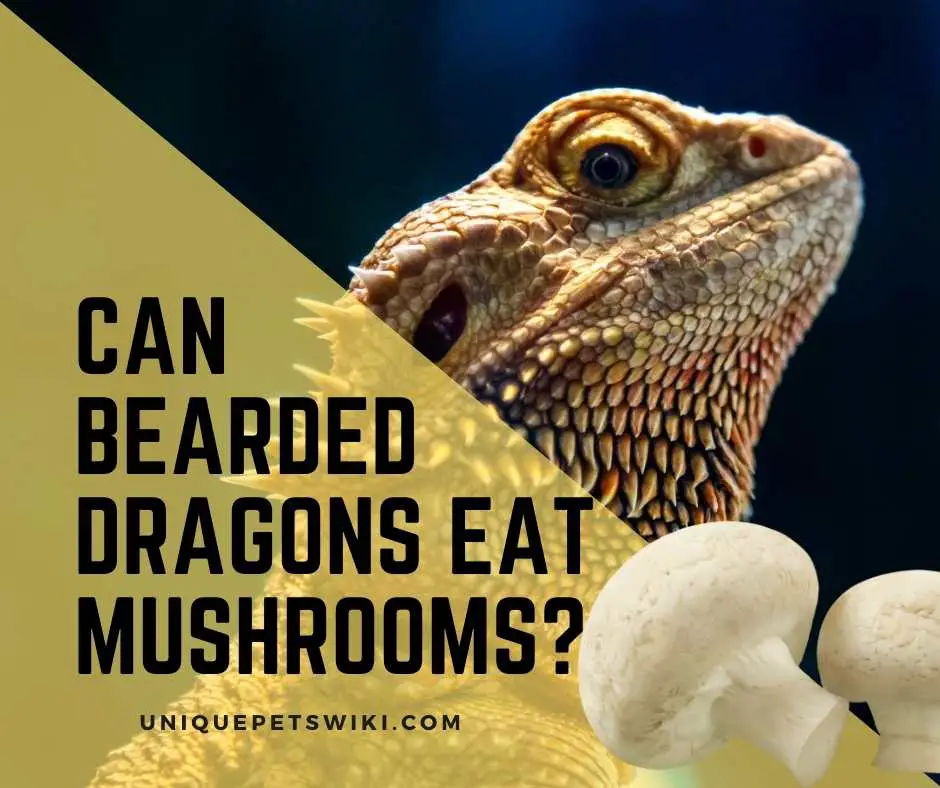Do you intend to feed mushrooms to your beardie but wonder if bearded dragons can eat mushrooms? Well, here is the right place to get the answer.
The diet for the beardies can be quite tricky because they require a mixture of insects, veggies, and greens. You will find yourself wondering now and then about which foods are safe to feed bearded dragons and those that are not.
Mushrooms are nutritious foods edible to humans from many years ago and have many benefits towards their health. Now, our primary concern here is whether the beardies can as well eat mushrooms.
Further in the article, we’ll learn if bearded dragons can eat mushrooms, benefits and hazards of feeding mushrooms to the beardies, and lots more.
This article has been reviewed by Dr. Dilber. Read more about our knowledge control process here.
Contents
What to Know About Mushrooms?
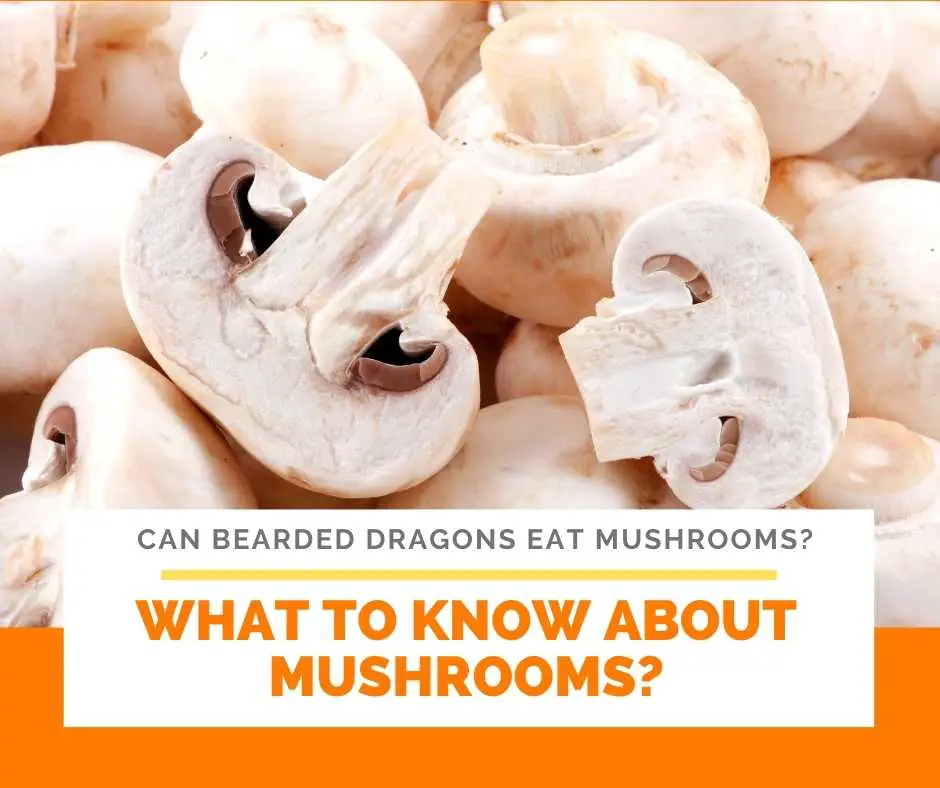
Before you even choose to feed mushrooms to your bearded dragon, it is crucial to consider mushrooms’ nutritional facts. Check for particular items including, calcium, phosphorus, fiber, sugar, water, acidity, fat, and protein content.
Knowing about the nutritional facts of every food you intend to feed to your bearded dragons pets is necessary to prevent loading them with foods that are not helpful. It helps to know what foods are safe for the beardies to eat.
Typically, the calcium to phosphorus requirement in bearded dragons is about 1.5:1 or 2:1. It’s the ideal ratio for these two minerals, and at this level, there is effective absorption of calcium from the diet to the body.
When it comes to mushrooms, the calcium to phosphorus ratio is out of proportion to the level required. It has less calcium and more of phosphorus, which is at a ratio of 1:29. So, due to low Ca:P in mushroom, it may not be the best food to offer to your pet.
Here are the nutritional facts in 100 grams of mushroom, according to the United States Department of Agriculture (USDA). It is about the nutrients contained in white mushrooms.
- Energy: 22 Kcal
- Water: 92%
- Sodium: 5mg
- Potassium: 318mg
- Calcium: 3mg
- Phosphorus: 86mg
- Vitamin C: 2.1mg
- Sugar: 2g
- Dietary fiber: 1g
- Protein: 3.1g
- Total fat: 0.3g
Moreover, mushrooms do not have cholesterol, they contain magnesium, iron, vitamin B-6 and C, but they are quite acidic, with a pH of 6.0.
By just observing the list above, you can notice some concern issues about mushrooms, especially the Ca:P makes it unideal food to reptiles.
Can Bearded Dragons Eat Mushrooms?
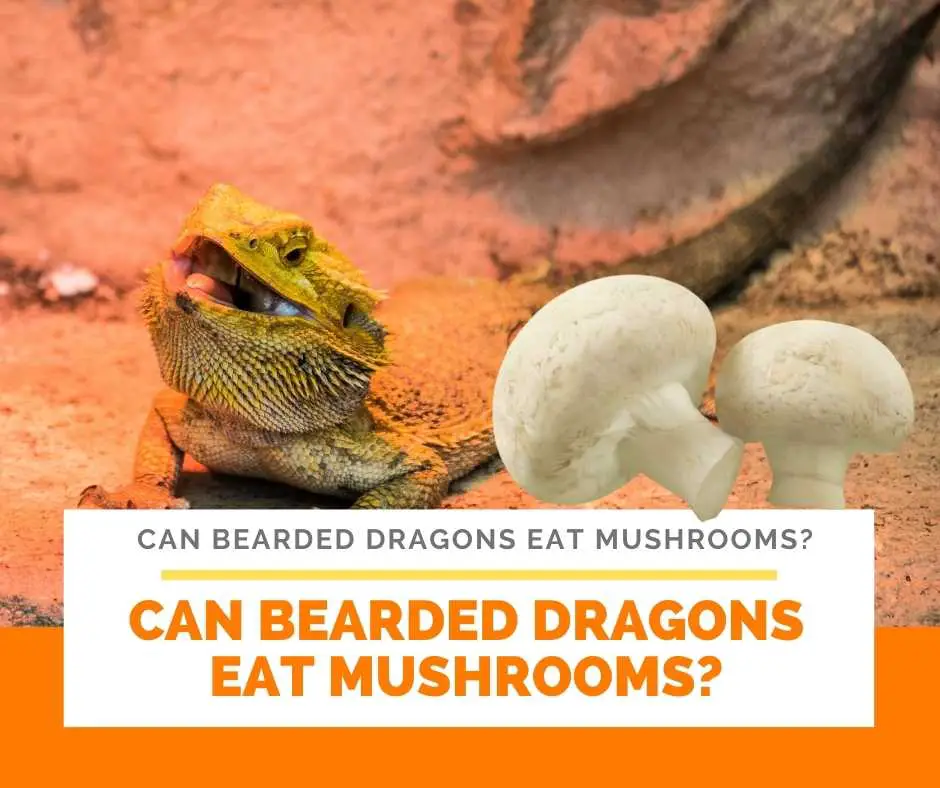
Mushrooms have a greater health benefit to humans as they have lots of vitamins and are low in calories, but unfortunately, they can be poisonous to bearded dragons. The entire mushroom is toxic to the beardies and they should not eat them at all.
It would be best if you never fed mushrooms to your beardie because they are acidic and have disproportionate Ca:P. They are pretty toxic and can even kill your pet, so, the best way is to avoid mushrooms of any kind no matter what is the circumstance.
Why are Mushrooms Not Good for Bearded Dragons?
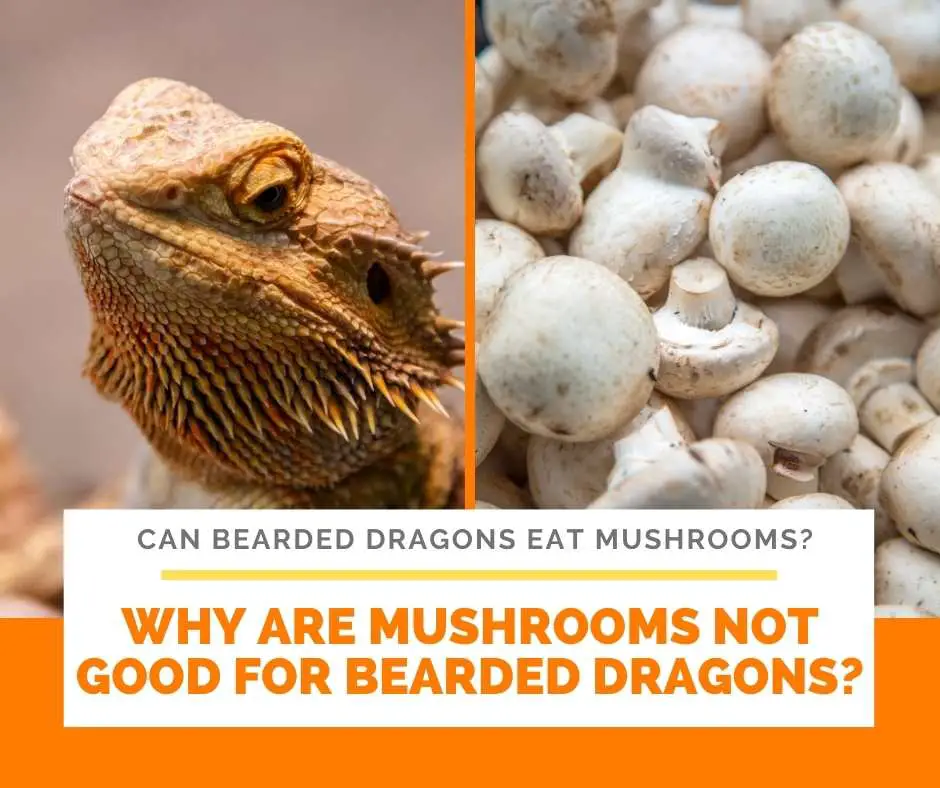
The two significant downsides about mushrooms are their disastrous calcium to phosphorus ratio and acidity. This is what makes mushrooms unideal foods for the beardies.
Other foods like avocados are not ideal for feeding bearded dragons because they are toxic and should also be avoided. For instance, avocados contain oxalic acid that can kill your dragon, especially in high dosage. Even in small amounts, they are still harmful.
So, now you know that you should never give mushrooms to bearded dragons. Let’s see the dangers that mushrooms can pose to bearded lizards in-depth.
Low Calcium to Phosphorus ratio in Mushrooms
The main reason why mushrooms can be dangerous if fed to bearded dragons is that its proportion of calcium to phosphorus is disastrous. When it comes feeding bearded dragons, you need to know all foods that have more phosphorus than calcium and avoid them.
Calcium is essential for the formation of healthy bones and tissues, and also to maintain good overall health. Maintaining an appropriate balance between calcium and phosphorus in bearded dragons is extremely important.
Too much phosphorus interferes with the absorption of calcium, thus, exposing the beardie to health problems. For instance, calcium deficiency in bearded dragons results in metabolic bone disease and there is the deterioration of the bearded dragons’ health.
If a particular food is edible to bearded dragons and it has too much phosphorus than calcium, the best thing is to use it rarely as a treat and never a staple thing. But if you choose to avoid such foods, it would be much better.
If I were you, I would include mushrooms in the list of things to avoid in bearded dragons, and this way, you will be safe.
Mushrooms Toxicity
There are many types of mushrooms out there, but, unfortunately, they can all be toxic to most of the reptiles, particularly bearded dragons.
Although some species of mushrooms are edible to humans, none of them is safe for the beardies. You will find categories of the best and delicious mushrooms on the internet, but I don’t see it necessary to discuss them here because the beardies won’t eat either of them.
Areas with high moisture content are prone to mushroom growth, and this can be your garden, garage, yard, basement, among others. The beardies can access mushrooms from these areas.
If you are that person who allows his/her dragons to have a good time moving around in your compound, it’s recommended to inspect the area and make sure there are no mushrooms. A bearded dragon does not know which food can be toxic to it and which one is safe.
So, you can prevent the pet from consuming any mushroom or other toxic materials accidentally by ensuring that your area is free of them.
Mushrooms Contain Oxalic Acid
Too much phosphorus is not the only thing that obstructs calcium absorption, but oxalic acid does the same thing. Mushrooms have oxalic acid, which combines with calcium to calcium oxalate, which is insoluble and indigestible.
The acidity of mushrooms is due to oxalic acids. Calcium oxalate is insoluble and it can cause damage to the kidneys as well.
A reaction between calcium and oxalic acid reduces the calcium level in the beardie’s body, making it unavailable for absorption. The low amount of calcium that will be remaining is not sufficient as it cannot meet the beardie’s daily calcium requirement.
The body, in return, depends on other calcium sources like bones where they extract the mineral to make for the low amount of calcium. Eventually, the removal of calcium from the bones can cause metabolic bone diseases.
What Happens If a Bearded Dragon Consumes Mushroom?
Sometimes a beardie can eat mushrooms by mistake in the yard when you take it outside the cage to bask and warm itself from the sunlight.
If your pet consumes mushrooms, it may lead to poisoning, but this depends on the beardie’s vulnerability and the type of mushroom.
Mushroom poisoning in bearded dragons is noticeable through various signs including, diarrhea and vomiting due to irritations in the gastrointestinal tract. This can last anywhere between 6-24 hours.
You may not need to see a reptile vet if your pet is only vomiting and have diarrhea with no other symptoms. It is only mild poisoning.
However, other symptoms like pupil constriction, production of tears and drooling, depression, lack of energy, seizure, bleeding, among others are severe and require a reptile vet intervention.
But it is always good to inform a reptile vet if you suspect that your bearded dragon has eaten mushrooms.
Conclusion
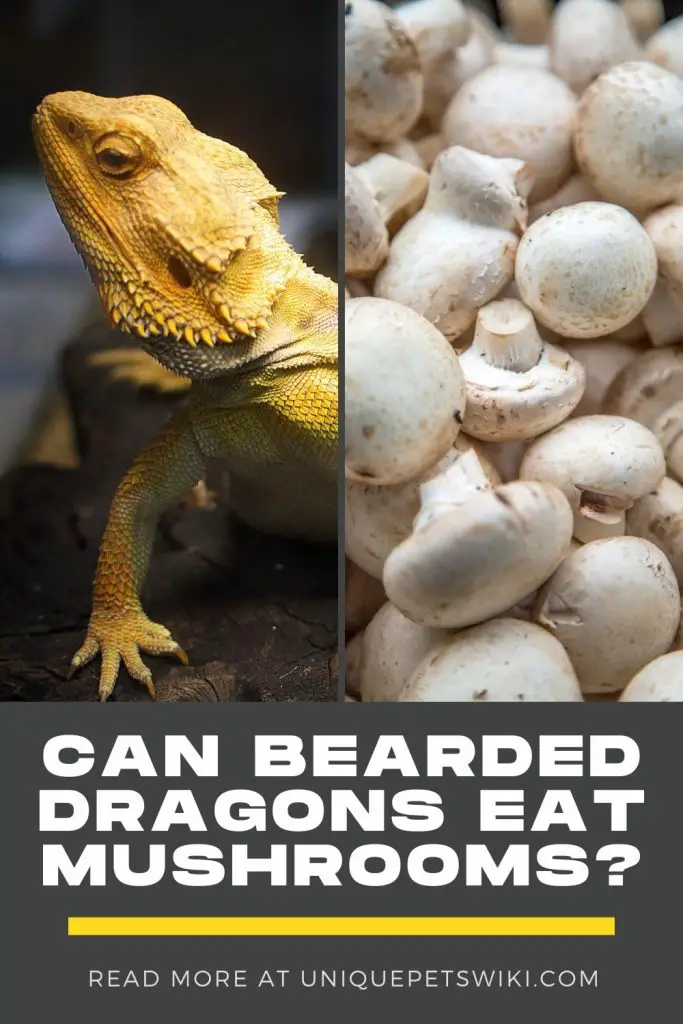
Bearded dragons should not be fed with mushrooms because they are acidic and have disproportionate Ca:P.
Likewise, all varieties of mushrooms are toxic to bearded dragons and can result in poisoning.
